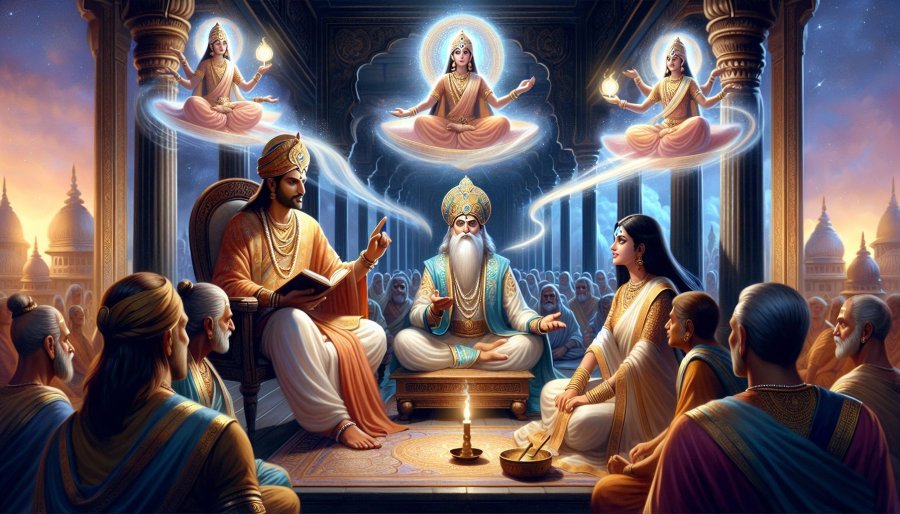Section CXXII - Ancient Practices of Kunti and Pandu: Summoning the God of Justice
Book index: Mahabharata (English)
This page contains a summary of the Mahabharata Section CXXII including examples of moral lessons in daily life. The Maha-Bharata is one of the largest epics ever written containing roughly 100,000 Sanskrit verses. It deals with the legendary history of ancient India and contains a large number of interwoven tales.

Short summary of the chapter:
King Pandu tells Kunti about the ancient practices where women were free to have multiple partners, but Svetaketu changed this by establishing the current practice of monogamy out of anger. He explains how it is now sinful for women to not adhere to their husbands, based on the teachings of Rishis. Pandu asks Kunti to raise offspring through a Brahmana since he is unable to procreate.
Kunti recalls a mantra given to her by Rishi Durvasa in her youth, which allows her to summon any celestial to have offspring. She offers to use this mantra to fulfill Pandu's desire for children. Pandu suggests contacting the god of justice, believing that a child from him would be virtuous and respected by all.
Kunti agrees to summon the god of justice as per Pandu's wishes. She prepares herself to use the mantra and calls upon the celestial being with her incantations. The god of justice appears before Kunti, and she conceives a son with him, who is destined to be noble and righteous.
Kunti gives birth to a son named Yudhishthira, who grows up to be known for his righteousness and adherence to moral values. Pandu and Kunti are overjoyed with their son's virtues and his future prospects as a noble leader. The story highlights the importance of following virtuous practices and the rewards that come from adhering to them.
Full English translation:
This page is merely a summary which is automatically generated. If you are looking for authentic sources such as the Sanskrit text or the Full English translation of Mahabharata Section CXXII - Ancient Practices of Kunti and Pandu: Summoning the God of Justice, have a look at the following articles:
Section CXXII, online text
English translation by Kisari Mohan Ganguli.
Read this and other chapters online.
Mahabharata (English Summary)
by Kisari Mohan Ganguli | ISBN-10: 8121505933
Buy the latest edition:
FAQ of Mahabharata, Section CXXII:
Summoning a Celestial Being
How did Kunti acquire the power to summon celestials? She received a boon from the Rishi Durvasa in her father's house.
Why did Pandu suggest summoning the god of justice?
Pandu believed that a child begotten from the god of justice would be virtuous and uphold righteousness always.
What was Kunti's response to Pandu's suggestion?
Kunti agreed to summon the god of justice as per Pandu's wish and resolved to do his bidding.
What was the significance of summoning the god of justice?
Summoning the god of justice ensured that the child born would be virtuous and uphold righteousness always.
Daily life: Ancient Practices of Kunti and Pandu: Summoning the God of Justice:
The story from the Mahabharata, where King Pandu and Kunti discuss the moral practices of ancient times and how they evolved, offers valuable lessons for daily living. It highlights the importance of adapting to times while holding onto core values, and the power of independent decision-making within the boundaries of moral and ethical considerations. Kunti's willingness to support her husband's wishes, combined with Pandu's deep respect for virtue and the prevailing moral standards, underscores how mutual respect and understanding are foundational in relationships.
In applying these principles to daily life, it becomes evident that communication and compromise are essential. Just as Pandu and Kunti discuss and navigate their situation openly, individuals today must engage in honest and respectful conversations with their partners and family members. The story also suggests that while traditions and societal norms are important, there is room for personal interpretation and application in a way that aligns with one's values and the wellbeing of all involved.
Furthermore, the narrative shows how seeking creative solutions can be beneficial. Kunti uses a boon to address their predicament in a way that is considerate of her husband's limitations, demonstrating that thinking outside conventional norms can lead to fulfilling outcomes when done thoughtfully. This teaches that innovation, coupled with ethical considerations, can be a valuable tool in overcoming personal and communal challenges.
Lastly, the emphasis on virtue and morality by both Pandu and Kunti, especially in their consideration of how their actions would be perceived and their impacts on future generations, is a poignant reminder of the long-term effects of our decisions. It teaches that in making choices, big or small, priority should be given to what is righteous and beneficial not only for oneself but also for society at large. Thus, the story encapsulates the essence of living a life guided by virtue, mutual respect, thoughtful communication, and innovative yet ethical problem-solving.
